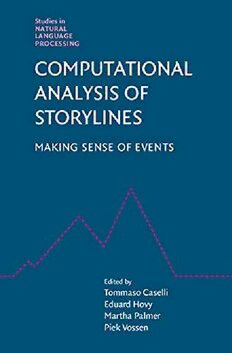
Computational Analysis of Storylines: Making Sense of Events PDF
Preview Computational Analysis of Storylines: Making Sense of Events
ComputationalAnalysisofStorylines Eventstructuresarecentralinlinguisticsandartificialintelligenceresearch:People caneasilyrefertochangesintheworld,identifytheirparticipants,distinguishrelevant information,andhaveexpectationsofwhatcanhappennext.Partofthisprocessis basedonmechanismssimilartonarratives,whichareattheheartofinformation sharing.Butitremainsdifficulttoautomaticallydetecteventsorautomatically constructstoriesfromsucheventrepresentations.Thisbookexploreshowtohandle today’smassivenewsstreamsandprovidesmultidimensional,multimodal,and distributedapproaches,likeautomateddeeplearning,tocaptureeventsandnarrative structuresinvolvedina“story.”Thisoverviewofthecurrentstate-of-the-artonevent extraction,temporalandcasualrelations,andstorylineextractionaimstoestablisha newmultidisciplinaryresearchcommunitywithacommonterminologyandresearch agenda.Graduatestudentsandresearchersinnaturallanguageprocessing, computationallinguistics,andmediastudieswillbenefitfromthisbook. tommaso caselliisanAssistantProfessorinComputationalSemanticsatthe UniversityofGroningen.HereceivedhisPhDincomputationallinguisticson temporalprocessingoftextsfromtheUniversityofPisa.Hismainresearchareasare indiscourseprocessing,eventextraction,and(event)sentimentanalysis.Heisoneof thefoundersofthe“EventandStoriesintheNews”workshopseriesandiscurrently workingondevelopingcomputationalmodelsandnaturallanguageprocessingtoolsto extractplotstructuresfromnews.Hetookpartinorganizingsemanticevaluation campaignsinnaturallanguageprocessingforEnglishandItalian. eduard hovyisaResearchProfessorattheLanguageTechnologyInstituteat CarnegieMellonUniversity.HewasawardedhonorarydoctoratesfromtheNational DistanceEducationUniversity(UNED)inMadridin2013andtheUniversityof Antwerpin2015.Heisoneoftheinitial17FellowsoftheAssociationfor ComputationalLinguistics(ACL).Hisresearchcontributionsincludethe co-developmentoftheROUGEtextsummarizationevaluationmethod,theBLANC coreferenceevaluationmethod,theOmegaontology,theWebclopediaQATypology, theFEMTImachinetranslationevaluationclassification,theDAPtextharvesting method,theOntoNotescorpus,andamodelofstructureddistributionalsemantics. martha palmerisaProfessorattheUniversityofColoradoinLinguistics, ComputerScience,andCognitiveScience.SheisaAAAIFellowandanACLFellow. Sheworksontryingtocaptureelementsofthemeaningsofwordsthatcancomprise automaticrepresentationsofcomplexsentencesanddocuments.Sheisaco-editor ofLinguisticIssuesinLanguageTechnologyandhasbeenontheCLJEditorial Boardandaco-editorofJNLE.SheisapastPresidentoftheAssociationfor ComputationalLinguistics,pastChairofSIGLEXandSIGHAN,andwasthe Directorofthe2011LinguisticsInstituteheldinBoulder,Colorado. piek vossenisProfessoratVrijeUniversiteitAmsterdam.Heistheco-founder andco-presidentoftheGlobalWordnetAssociation,organizingtheinternational Wordnetconferencessince2002.In2013,hereceivedtheDutchSpinozaprizeforhis research.Heusedthisprizetolaunchaseriesofprojectsthatincludedthestructuring ofnewsstreamsusingstorylinesandreader/writerperspectives.Vossen’scurrentmain researchfocusesoncross-documenteventco-referenceandperspectivemodelingof multiplesourceswithrespecttoeventdataandmodelingeventimplications,aswellas eventtimelinesandstorylines. StudiesinNaturalLanguageProcessing SeriesEditor: Chu-RenHuang,TheHongKongPolytechnicUniversity AssociateSeriesEditor: QiSu,PekingUniversity EditorialBoardMembers: NianwenXue,BrandeisUniversity MaartendeRijke,UniversityofAmsterdam LoriLevin,CarnegieMellonUniversity AlessandroLenci,UniversitadegliStudi,Pisa FrancisBond,NanyangTechnologicalUniversity Thisseriesofferswidelyaccessibleaccountsofthestateoftheartinnatural languageprocessing.Establishedonthefoundationsofformallanguage theoryandstatisticallearning,naturallanguageprocessingisburgeoningwith thewidespreaduseoflargeannotatedcorpora,richmodelsoflinguistic structure,andrigorousevaluationmethods.Newmultilingualandmultimodal languagetechnologieshavebeenstimulatedbythegrowthoftheweband pervasivecomputingdevices.Theseriesstrikesabalancebetweenstatistical versussymbolicmethods;deepversusshallowprocessing;rationalismversus empiricism;andfundamentalscienceversusengineering.Eachvolumesheds lightonthesepervasivethemes,delvingintotheoreticalfoundationsand currentapplications.Theseriesisaimedatabroadaudiencewhoaredirectly orindirectlyinvolvedinnaturallanguageprocessing,fromfieldsincluding corpuslinguistics,psycholinguistics,informationretrieval,machinelearning, spokenlanguage,human-computerinteraction,robotics,languagelearning, ontologies,anddatabases. Alsointheseries DouglasE.Appelt,PlanningEnglishSentences MadeleineBatesandRalphM.Weischedel(eds.),ChallengesinNatural LanguageProcessing StevenBird,ComputationalPhonology PeterBoschandRobvanderSandt,Focus TheLanguageofWordMeaning:(editors)FedericaBusaandPierrette Bouillon Inheritance,DefaultsandtheLexicon:(editors)TedBriscoe,ValeriadePaiva, andAnnCopestake RonaldCole,JosephMariani,HansUszkoreit,GiovanniVarile, AnnieZaenen,AntonioZampolli,andVictorZue(eds.),SurveyoftheState oftheArtinHumanLanguageTechnology DavidR.Dowty,LauriKarttunen,andArnoldM.Zwicky(eds.), NaturalLanguageParsing RalphGrishman,ComputationalLinguistics GraemeHirst,SemanticInterpretationandtheResolutionofAmbiguity Andra´sKornai,ExtendedFiniteStateModelsofLanguage KathleenR.McKeown,TextGeneration MarthaStonePalmer,SemanticProcessingforFiniteDomains TerryPatten,SystemicTextGenerationasProblemSolving EhudReiterandRobertDale,BuildingNaturalLanguageGenerationSystems MannyRayner,DavidCarter,PieretteBouillon,VassilisDigalakis,and MatisWiren(eds.),TheSpokenLanguageTranslator MichaelRosnerandRoderickJohnson(eds.),Computational LexicalSemantics RichardSproat,AComputationalTheoryofWritingSystems GeorgeAntonKiraz,ComputationalNonlinearMorphology NicholasAsherandAlexLascarides,LogicsofConversation MargaretMasterman(editedbyYorickWilks),Language,CohesionandForm WalterDaelemansandAntalvandenBosch,Memory-Based LanguageProcessing Chu-RenHuang,NicolettaCalzolari,AldoGangemi,AlessandroLenci, AlessandroOltramari,andLaurentPre´vot(eds.),OntologyandtheLexicon: ANaturalLanguageProcessingPerspective ThierryPoibeauandAlineVillavicencio(eds.),Language,Cognition,and ComputationalModels BindLiu,SentimentAnalysis:MiningOpinions,Sentiments,andEmotions, SecondEdition MarcosZampieriandPreslavNakov,SimilarLanguages,Varieties,and Dialects:AComputationalPerspective Computational Analysis of Storylines Making Sense of Events Editedby TOMMASO CASELLI UniversityofGroningen EDUARD HOVY CarnegieMellonUniversity,Pennsylvania MARTHA PALMER UniversityofColoradoatBoulder PIEK VOSSEN VrijeUniversiteit,Amsterdam UniversityPrintingHouse,CambridgeCB28BS,UnitedKingdom OneLibertyPlaza,20thFloor,NewYork,NY10006,USA 477WilliamstownRoad,PortMelbourne,VIC3207,Australia 314–321,3rdFloor,Plot3,SplendorForum,JasolaDistrictCentre, NewDelhi–110025,India 103PenangRoad,#05–06/07,VisioncrestCommercial,Singapore238467 CambridgeUniversityPressispartoftheUniversityofCambridge. ItfurtherstheUniversity’smissionbydisseminatingknowledgeinthepursuitof education,learning,andresearchatthehighestinternationallevelsofexcellence. www.cambridge.org Informationonthistitle:www.cambridge.org/9781108490573 DOI:10.1017/9781108854221 ©CambridgeUniversityPress2021 Thispublicationisincopyright.Subjecttostatutoryexception andtotheprovisionsofrelevantcollectivelicensingagreements, noreproductionofanypartmaytakeplacewithoutthewritten permissionofCambridgeUniversityPress. Firstpublished2021 PrintedintheUnitedKingdombyTJBooksLimited,PadstowCornwall AcataloguerecordforthispublicationisavailablefromtheBritishLibrary. LibraryofCongressCataloging-in-PublicationData Names:Caselli,Tommaso,1980–editor.|Palmer,MarthaStone,editor.| Hovy,EduardH.,editor.|Vossen,Piek,editor. Title:Computationalanalysisofstorylines:makingsenseofevents/ editedbyTommasoCaselli,MarthaPalmer,EduardHovy,PiekVossen. Description:NewYork:CambridgeUniversityPress,2021.|Series:Studies innaturallanguageprocessing|Includesbibliographicalreferences. Identifiers:LCCN2021024558(print)|LCCN2021024559(ebook)| ISBN9781108490573(hardback)|ISBN9781108854221(epub) Subjects:LCSH:Discourseanalysis,Narrative.|Narration(Rhetoric)–Data processing.|Naturallanguageprocessing(Computerscience)| BISAC:COMPUTERS/ArtificialIntelligence/NaturalLanguageProcessing| LCGFT:Essays. Classification:LCCP302.7.C6562021(print)|LCCP302.7(ebook)| DDC401/.41–dc23 LCrecordavailableathttps://lccn.loc.gov/2021024558 LCebookrecordavailableathttps://lccn.loc.gov/2021024559 ISBN978-1-108-49057-3Hardback CambridgeUniversityPresshasnoresponsibilityforthepersistenceoraccuracy ofURLsforexternalorthird-partyinternetwebsitesreferredtointhispublication anddoesnotguaranteethatanycontentonsuchwebsitesis,orwillremain, accurateorappropriate. Contents ListofContributors pagexi IntroductionandOverview 1 PARTONE FOUNDATIONALCOMPONENTSOF STORYLINES 21 1 TheRoleofEvent-BasedRepresentationsand ReasoninginLanguage 23 JamesPustejovsky 1.1 Introduction 23 1.2 IntroducingSituationsandEvents 25 1.3 ModelingtheSubstructureofEvents 33 1.4 EnrichingVerbNetwithEventDynamics 38 1.5 Conclusions 42 2 TheRichEventOntology:OntologicalHubfor EventRepresentations 47 ClaireBonial,SusanW.Brown,MarthaPalmer, andGhazalehKazeminejad 2.1 Introduction 47 2.2 Ontologies 48 2.3 SemanticRoleLabeling 56 2.4 Conclusions,Gaps,andFutureWork 61 3 DecomposingEventsandStorylines 67 WilliamCroft,Pavl´ınaKalm,andMichaelRegan 3.1 Introduction:EventswithinStoriesandEventswithinEvents 67 3.2 ConstructionsasWellasVerbsDeterminetheInternal StructureofEvents 69 vii viii Contents 3.3 TimeandQualitativeState(Change) 71 3.4 Causation 74 3.5 AnnotationScheme 78 3.6 Visualization 80 3.7 Conclusion 82 4 ExtractingandAligningTimelines 87 MarkA.Finlayson,AndresCremisini,andMustafaOcal 4.1 Introduction 87 4.2 ExtractingTimelines 89 4.3 AligningTimelines 95 4.4 BringingItAllTogether 100 4.5 Conclusion 101 5 EventCausality 106 ParamitaMirza 5.1 Introduction 106 5.2 ModellingCausalRelations 108 5.3 CausalAnnotationinNaturalLanguageText 110 5.4 ExtractingEventCausality 114 5.5 CausalCommonsenseDiscovery 117 5.6 Conclusions 120 6 ANarratology-BasedFrameworkforStorylineExtraction 125 PiekVossen,TommasoCaselli,andRoxaneSegers 6.1 Introduction 125 6.2 ANarratology-GroundedFrameworkforStorylinesIdentification 126 6.3 FromTheorytoData:AnnotatingCauselinesandStorylines 130 6.4 ValidatingCauselinesandExtractingStorylines 134 6.5 Conclusion 137 PARTTWO CONNECTINGTHEDOTS:RESOURCES, TOOLS,ANDREPRESENTATIONS 143 7 TheRicherEventDescriptionCorpusfor Event–EventRelations 145 TimO’Gorman,KristinWright-Bettner,andMarthaPalmer 7.1 Introduction 145 7.2 AComparisonofEventAnnotationChoices 146 7.3 Long-DistanceRelationsinRED:Contains,Causality, andCoreference 155 Contents ix 7.4 StudyingREDImpactonEventOrdering 156 7.5 Conclusions 158 8 Low-ResourceEventExtractionviaShare-and-Transfer andRemainingChallenges 163 HengJiandClareVoss 8.1 Introduction 163 8.2 ApproachOverview 166 8.3 Share:ConstructionofCommonSemanticSpace 167 8.4 Transfer:FromHigh-toLow-ResourceSetting 175 8.5 TransferLearningPerformance 177 8.6 RemainingChallenges 177 8.7 ConclusionsandFutureResearchDirections 182 9 ReadingCertaintyacrossSources 187 BenjaminMiller 9.1 Introduction 187 9.2 Background 192 9.3 Methods 194 9.4 Results 195 9.5 Discussion 198 9.6 Conclusion 200 10 NarrativeHomogeneityandHeterogeneityin DocumentCategories 203 DanSimonsonandAnthonyR.Davis 10.1 Introduction:NarrativeSchemasandTheirEvaluations 203 10.2 Background 205 10.3 DataandSchemaGeneration 206 10.4 EvidencethroughNASTEATask 208 10.5 EvidencethroughSchemaStability 213 10.6 Discussion 216 10.7 Conclusions 217 11 ExploringMachineLearningTechniquesforLinking EventTemplates 221 JakubPiskorski,FrediSˇaric´,VanniZavarella,andMartinAtkinson 11.1 Introduction 221 11.2 TaskDescription 224 11.3 EventSimilarityMetrics 225 11.4 Experiments 230 11.5 Conclusions 236
